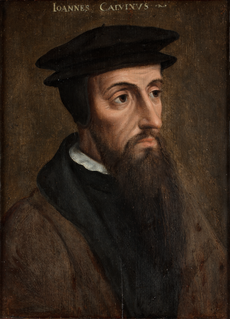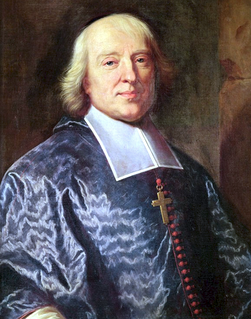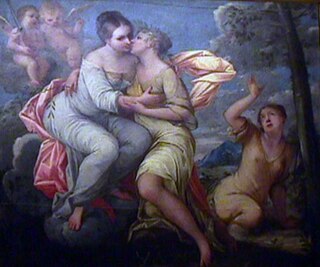
John Calvin was a French theologian, pastor and reformer in Geneva during the Protestant Reformation. He was a principal figure in the development of the system of Christian theology later called Calvinism, including its doctrines of predestination and of God's absolute sovereignty in the salvation of the human soul from death and eternal damnation. Calvinist doctrines were influenced by and elaborated upon the Augustinian and other Christian traditions. Various Congregational, Reformed and Presbyterian churches, which look to Calvin as the chief expositor of their beliefs, have spread throughout the world.

The Book of Psalms, commonly referred to simply as Psalms, the Psalter or "the Psalms", is the first book of the Ketuvim ("Writings"), the third section of the Tanakh, and a book of the Christian Old Testament. The title is derived from the Greek translation, ψαλμοί, meaning "instrumental music" and, by extension, "the words accompanying the music". The book is an anthology of individual Hebrew religious hymns, with 150 in the Jewish and Western Christian tradition and more in the Eastern Christian churches. Many are linked to the name of David, but modern scholarship rejects his authorship, instead placing the composition of the psalms to various authors writing between the 9th and 5th centuries BC.

Jacques-Bénigne Lignel Bossuet was a French bishop and theologian, renowned for his sermons and other addresses. He has been considered by many to be one of the most brilliant orators of all time and a masterly French stylist.

The St. Bartholomew's Day massacre in 1572 was a targeted group of assassinations and a wave of Catholic mob violence, directed against the Huguenots during the French Wars of Religion. Traditionally believed to have been instigated by Queen Catherine de' Medici, the mother of King Charles IX, the massacre took place a few days after the wedding day of the king's sister Margaret to the Protestant Henry of Navarre. Many of the wealthiest and most prominent Huguenots had gathered in largely Catholic Paris to attend the wedding.
Hallelujah is an interjection used as an expression of gratitude and adoration. The term is used 24 times in the Hebrew Bible, twice in deuterocanonical books, and four times in the Christian Book of Revelation.

Claude Goudimel was a French composer, music editor and publisher, and music theorist of the High Renaissance.

The Protestant Ethic and the Spirit of Capitalism is a book written by Max Weber, a German sociologist, economist, and politician. Begun as a series of essays, the original German text was composed in 1904 and 1905, and was translated into English for the first time by American sociologist Talcott Parsons in 1930. It is considered a founding text in economic sociology and a milestone contribution to sociological thought in general.

The Protestant work ethic, also known as the Calvinist work ethic or the Puritan work ethic, is a work ethic concept in theology, sociology, economics and history which emphasizes that diligence, discipline, and frugality are a result of a person's subscription to the values espoused by the Protestant faith, particularly Calvinism.

The Genevan Psalter, also known as The Huguenot Psalter, is a metrical psalter in French created under the supervision of John Calvin for liturgical use by the Reformed churches of the city of Geneva in the sixteenth century.
Jean de Sponde was a Baroque French poet.

Psalm 95 is the 95th psalm of the Book of Psalms, beginning in English in the King James Version: "O come, let us sing unto the LORD: let us make a joyful noise to the rock of our salvation.". The Book of Psalms starts the third section of the Hebrew Bible, and, as such, is a book of the Christian Old Testament. In the slightly different numbering system in the Greek Septuagint version of the Bible, and in the Latin Vulgate, this psalm is Psalm 94. In Latin, it is known as "Venite exultemus". The psalm is a hymn psalm, one of the Royal psalms, praising God as the King of His people. Psalm 95 identifies no author, but Hebrews 4:7 attributes it to David. The Vulgate also names David as the author.
Quiet time, also stated as heart-to-heart time, or one-on-one time with the creator, is a regular individual session of Christian spiritual activities, such as prayer, private meditation, contemplation, worship of God or study of the Bible. The term "quiet time" or "sacred time" is used by 20th-century Protestants, mostly evangelical Christians. It is also called "personal Bible study" or "personal devotions". Rick Warren points out that it has also been called "morning watch" and "appointment with God".

Psalm 148 is the 148th psalm of the Book of Psalms, beginning in English in the King James Version: "Praise ye the Lord from the heavens". The Book of Psalms is part of the third section of the Hebrew Bible, and a book of the Christian Old Testament. In Latin, this psalm is known as "Laudate Dominum de caelis". The psalm is one of the Laudate psalms. Old Testament scholars have also classified it as a creation psalm and a wisdom psalm.

Psalm 24 is the 24th psalm of the Book of Psalms, beginning in English in the King James Version: "The earth is the LORD's, and the fulness thereof". In the slightly different numbering system used in the Greek Septuagint version of the Bible and the Latin Vulgate, this psalm is Psalm 23. In Latin, it is known as "Domini est terra et plenitudo eius orbis terrarum". The psalm is marked as a Psalm of David.

Psalm 27, also referred to as L'Dovid and Dominus illuminatio mea after its opening words, is the 27th Psalm from the Book of Psalms.

Psalm 46 is the 46th psalm of the Book of Psalms, beginning in English in the King James Version: "God is our refuge and strength, a very present help in trouble". In the slightly different numbering system used in the Greek Septuagint and Latin Vulgate translations of the Bible, this psalm is Psalm 45. In Latin, it is known as "Deus noster refugium et virtus". The song is attributed to the sons of Korah.

Psalm 85 is the 85th psalm of the Book of Psalms, beginning in English in the King James Version: "LORD, thou hast been favourable unto thy land". In the Greek Septuagint version of the Bible, and in the Latin Vulgate, this psalm is Psalm 84 in a slightly different numbering system. In Latin, it is known as "Benedixisti Domine terram tuam". In Judaism, it is called "a psalm of returned exiles". The psalm is attributed to the sons of Korah.

The 1562 Riots of Toulouse are a series of events that pitted members of the Reformed Church of France against members of the Roman Catholic Church in violent clashes that ended with the deaths of between 3,000 and 5,000 citizens of the French city of Toulouse. These events exhibit the tensions that would soon explode into full civil war during the French Wars of Religion.
Jean de La Ceppède was a French nobleman, judge, and poet from Aix-en-Provence.
Church music during the Reformation developed during the Protestant Reformation in two schools of thought, the regulative and normative principles of worship, based on reformers John Calvin and Martin Luther. They derived their concepts in response to the Catholic church music, which they found distracting and too ornate. Both principles also pursued use of the native tongue, either alongside or in place of liturgical Latin.













